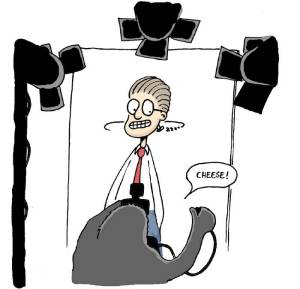|

Applying properly in Germany:
5 tips to avoid rejections
In Germany, the word on the street is that there is a lot of work to be had and there are many job vacancies - especially in areas where highly qualified skills are required. On the other hand, many applicants report that the process of applying is indeed difficult and that they have gotten used to rejection letters. How does this all add up?

For companies and HR departments, the CV is still the central document that is used to gain an initial assessment of an applicant. This fact is often not taken seriously enough by applicants. Anyone who reveals negligence in the preparation of their CV should not be surprised when they fail to make the first cut of an initial review of applications. Below, we've have listed what we believe to be the top 5 tips that are essential these days if you want to deliver an attractive resume – both in form and content.
- Zero tolerance for content and formal errors
- Only list job-relevant personal details
- Current activities take precedence over past activities
- Leave no gaps that could provoke the question marks
- Professionalism should be a character trait of your CV
1.Null tolerance for content and formal errors
Creating a contemporary CV is standard practice for those hoping to jump into their next professional job. CV text examples and many good ideas for how to formulate your CV content are abundant: popular wording, elementary text examples you remember from school, catch phrases used by the employment agency, and even digital templates on the Internet.
However, you should not be tempted to copy and paste the trending phrases from just anywhere. With all of these resources at your fingertips, there is still no getting around the fact that you will need to sit down in front of a white sheet of paper and formulate your own goals and create a detailed list of your own knowledge and experience. The chosen content should always be based on the desired job, it should be listed chronologically and kept short and concise. In the end, everything should be expressed in precise statements, accurate German, and in a clear layout.
2. Only list job-relevant personal details
Especially when it comes to personal information regarding volunteer activities, awards or achievements and hobbies, many applicants are tempted to go into too much detail regarding things that personally fascinate them the most.
However, these details will only interest a future employer if they are directly related to the job. Application content which is foreign to a particular industry or occupation can create unnecessary bulk in your CV and cover letter. Anything that does not undoubtedly help in convincing the employer of your particular suitability for the desired job, should be removed.
This is not to say that these details might not be of later use in an application for a different job or in a different industry, for example.
3. Current activities take precedence over past activities
This aspect of your CV is important in two ways.
First, the tabular order: traditionally, you might remember a chronological ordering of CV items including a list of earlier items (i.e. high school) ascending to the most current (i.e. latest job) as the CV progresses. However, it is definitely the other way around today. The most current items should be mentioned first.
Secondly, the most recent experiences with regard to the advertised job are usually regarded as most important. For example, in the case of professionally-skilled applicants, school and university education may become more and more obscure with professional experience, knowledge and successes. On this note, after a second job change and 5 years of work experience, it is no longer worth listing your basic schooling that preceded university.
4. Leave no gaps that could provoke the question marks
When it comes to careers and career choices, not every life path will be 100% straightforward and uninterrupted. Every employer knows this as well.
On the basis of the CV, however, a potential employer should be able to detect your overall path of development. The sequence of items and any parallel items should more or less be logical and understandable. If there are gaps in your chronology or logic, this could raise questions and cause doubts.
It is generally a standard part of any job interview to question such CV gaps. In order to avoid having to provide an awkward explanation, you should document your development path truthfully and completely. Those who try to use tactics that could trick an employer into overseeing gaps usually end up making a bad impression from the beginning.
If this topic does come up in an interview, it is often considered positive when you admit to an obviously wrong decision of the past. What matters are the conclusions that you are able to draw from these experiences.
For example, if you spent three years studying medicine before abruptly leaving university and joining a humanitarian mission that made you realize you actually wanted to become a water engineer, you should not be afraid to explain your decisions. Keep in mind that those who have prepared answers to potential difficult questions about any CV gaps or discrepancies will be at an advantage.
In this sense, a resume path with many twists and turns requires an even better line of reasoning than a developmental path that is straightforward.
5. Professionalism should be a character trait of your CV
"Every text has a mistake": even if this proverb applies to the vast majority of texts, mistakes in the CV are not to be excused. This not only applies to the honesty of your content, but also to German grammar.
Our recommendation is that you take a day to professionally create your CV, lay it to rest for a day, revise it carefully the next day, and if you think you have formulated something incorrectly, have one or two other people in your profession read it as well. Your readers should pay attention not only to grammar and sentence structure, but also to the logic and sequencing of your items.
In this way, you will create a resume that also matches your ideal business profile of yourself and expresses how much you value both the advertised job and the reader.
You will find more tips on CV creating and the application process in our book "The Business Professional's Guide to Success in Germany" that you can order as a paperback at amazon.com, amazon.de or order
directly from us. The eBook version is available for download.

Enjoy reading!
interested in some resume examples?
https://novoresume.com/career-blog/resume-examples
further tips:

Gift voucher for German online lessons
Our latest news always on Facebook.com/sprachinstitut.treffpunkt.online
Keywords:
job application in Germany, finding job, german business practices
versus american , german business practices , german business etiquette
and manners , german business culture characteristics , german business
culture , german business correspondence etiquette , business etiquette
in Germany , business communication germany etiquette
|
ORDER NOW

as paperback or ebook!
Direct book order >>>
|